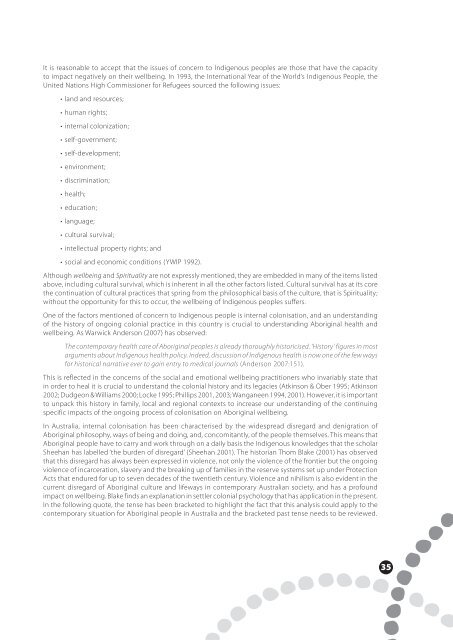DP9-Aboriginal-Spirituality
DP9-Aboriginal-Spirituality
DP9-Aboriginal-Spirituality
You also want an ePaper? Increase the reach of your titles
YUMPU automatically turns print PDFs into web optimized ePapers that Google loves.
It is reasonable to accept that the issues of concern to Indigenous peoples are those that have the capacity<br />
to impact negatively on their wellbeing. In 1993, the International Year of the World’s Indigenous People, the<br />
United Nations High Commissioner for Refugees sourced the following issues:<br />
• land and resources;<br />
• human rights;<br />
• internal colonization;<br />
• self-government;<br />
• self-development;<br />
• environment;<br />
• discrimination;<br />
• health;<br />
• education;<br />
• language;<br />
• cultural survival;<br />
• intellectual property rights; and<br />
• social and economic conditions (YWIP 1992).<br />
Although wellbeing and <strong>Spirituality</strong> are not expressly mentioned, they are embedded in many of the items listed<br />
above, including cultural survival, which is inherent in all the other factors listed. Cultural survival has at its core<br />
the continuation of cultural practices that spring from the philosophical basis of the culture, that is <strong>Spirituality</strong>;<br />
without the opportunity for this to occur, the wellbeing of Indigenous peoples suffers.<br />
One of the factors mentioned of concern to Indigenous people is internal colonisation, and an understanding<br />
of the history of ongoing colonial practice in this country is crucial to understanding <strong>Aboriginal</strong> health and<br />
wellbeing. As Warwick Anderson (2007) has observed:<br />
The contemporary health care of <strong>Aboriginal</strong> peoples is already thoroughly historicised. ‘History’ figures in most<br />
arguments about Indigenous health policy. Indeed, discussion of Indigenous health is now one of the few ways<br />
for historical narrative ever to gain entry to medical journals (Anderson 2007:151).<br />
This is reflected in the concerns of the social and emotional wellbeing practitioners who invariably state that<br />
in order to heal it is crucial to understand the colonial history and its legacies (Atkinson & Ober 1995; Atkinson<br />
2002; Dudgeon & Williams 2000; Locke 1995; Phillips 2001, 2003; Wanganeen 1994, 2001). However, it is important<br />
to unpack this history in family, local and regional contexts to increase our understanding of the continuing<br />
specific impacts of the ongoing process of colonisation on <strong>Aboriginal</strong> wellbeing.<br />
In Australia, internal colonisation has been characterised by the widespread disregard and denigration of<br />
<strong>Aboriginal</strong> philosophy, ways of being and doing, and, concomitantly, of the people themselves. This means that<br />
<strong>Aboriginal</strong> people have to carry and work through on a daily basis the Indigenous knowledges that the scholar<br />
Sheehan has labelled ‘the burden of disregard’ (Sheehan 2001). The historian Thom Blake (2001) has observed<br />
that this disregard has always been expressed in violence, not only the violence of the frontier but the ongoing<br />
violence of incarceration, slavery and the breaking up of families in the reserve systems set up under Protection<br />
Acts that endured for up to seven decades of the twentieth century. Violence and nihilism is also evident in the<br />
current disregard of <strong>Aboriginal</strong> culture and lifeways in contemporary Australian society, and has a profound<br />
impact on wellbeing. Blake finds an explanation in settler colonial psychology that has application in the present.<br />
In the following quote, the tense has been bracketed to highlight the fact that this analysis could apply to the<br />
contemporary situation for <strong>Aboriginal</strong> people in Australia and the bracketed past tense needs to be reviewed.<br />
35


